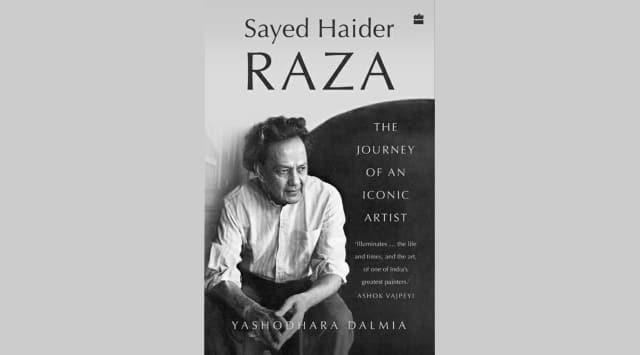One of the most successful artists of post-independence India, Sayed Haider Raza would have turned 100 next year. His birth centenary celebrations, launched by the Raza Foundation this year through exhibitions, etc., are an opportunity to ask an important question about his legacy: how do we re-interpret his life and art as we reach the anniversary milestone? This question can be expanded further: how do we read his work in the 21st century, especially in an era of radically transforming styles and methods of art production and exhibition-making? One way of responding to this question is to re-contextualise his work, especially his spiritually loaded Bindu vocabulary, in our present times of social and political crises. For example, in a recent exhibition of Raza’s geometric works at Akar Prakar, New Delhi, the curator and author Ranjit Hoskote interpreted the artist’s paintings as a point of symbolic return in the midst of widespread displacement and migration: In an epoch of displacement and migration, many of us are homeless under the sky. How do we find our way back to the consolation that Raza’s Neelambar offers, the blue mantle of the cosmos? In Raza’s late paintings, insistently, we find ourselves returned to the point of origin, Aarambh_, and the process of descending into the world,_ Avtaran_._ Pulsating with an immanent energy, in these paintings Raza sought to bring out a form-based order and a transcendental quality — a sense of balance and orderliness that is desperately found wanting in our fractured times of polarisation, censorship, intolerance, authoritarianism, etc. The other way of addressing the question of Raza’s legacy in the 21st century is through the domain of biography. A newly released biography, Sayed Haider Raza: The Journey Of An Iconic Artist, by the New Delhi-based historian and curator Yashodhara Dalmia does not confront the legacy question directly, but it ignites the reader’s appetite to seek newer perceptions about Raza’s work. Arguably the first definitive biography of the Madhya Pradesh-born artist, its prose is lucid and humanising in the re-telling of Raza’s life and work. The book traces his early life in close proximity to the green belt of the central Indian state, the Mumbai years as an aspiring painter, life in France where he became an artist of international repute, and his return to India in 2011. The biography is worth note because it is drawn from Dalmia’s long acquaintance with Raza, and her interviews with his colleagues from the Progressive Artists’ Group, such as MF Husain, Krishen Khanna, among other artists. A widely regarded historian of Indian/South Asian modern and contemporary art, with books on the Indian-Hungarian painter Amrita Sher-Gil and the Sri Lankan artist George Keyt to her credit, Dalmia’s latest project has, at the heart of it, the beginnings of modern art in post-independence India. It is arguably one of the most talked about and widely documented eras in Indian art history, and where the preeminence of the Progressives, as the torchbearers of modern art in India, continues to remain significant. Raza’s is a larger-than-life, looming presence in Indian modernism, and it is precisely because of this reason that writing a biography on him may have been as challenging as it would have been enticing. [caption id=“attachment_9452361” align=“alignnone” width=“640”]  Sayed Haider Raza: The Journey Of An Iconic Artist, by Yashodhara Dalmia[/caption] To a great extent, the biography’s 200-odd pages are based on previously published work and archival material on Raza, such as his personal letters and books, including publications by the historian Geeti Sen, and the poet and Raza Foundation trustee Ashok Vajpeyi, who was close to the artist. And yet, in its crisp re-telling of Raza’s ninety-four years, the biography humanises him; while demystifying the halo of greatness that exists around the artist, it paints the portrait of a man who was as vulnerable, fallible, ambitious and passionate as you and me. The life story of an artist can often get diluted in the frenzied calendar of exhibitions and auctions — both physical and digital. The chic gallery displays and the blue-chip charisma of Raza’s oeuvre have a tendency to make us overlook the gamut of influences and life events, both small and big, that made him who he was. For example, Raza was eleven years old when he had the opportunity to hear Mahatma Gandhi at a public meeting in 1933 in Mandla, Madhya Pradesh. “He did… reach the meeting but did not remember Gandhi’s words later, yet the image of the ‘half-naked fakir’ with a lathi in his hand made a lasting impact on Raza,” Dalmia quotes from Vajpeyi’s book Passion: Life and Art of Raza (2005). Because public memory can be short-lived, such revisitations, especially in a biographical form, are necessary to keep legacies alive. However, is the re-telling of a life story the only device to keep a legacy alive? How do we keep Raza relevant in the now? Coincidentally, these questions are also asked with respect to Gandhi, who had a deep impact on Raza’s work and whose 150th birth anniversary celebrations were launched by the Indian government in 2019. As an icon, Gandhi is omnipresent, but his humanistic essence is missing today. Raza is much canonised and moves markets. A lifelong commitment to his practice, the medium of painting; his humility and compassion; and his respect for diverse faiths keep his memory alive. Dalmia’s biography, commissioned by the Raza Foundation, dwells upon these qualities at considerable length, but it reaches its epilogue too soon, leaving a lot unsaid about the future of Raza as an artist.
The biography draws from Dalmia’s long acquaintance with Raza, and her interviews with his colleagues from the Progressive Artists’ Group, such as MF Husain and Krishen Khanna.
Advertisement
End of Article


)
)
)
)
)
)
)
)
)



